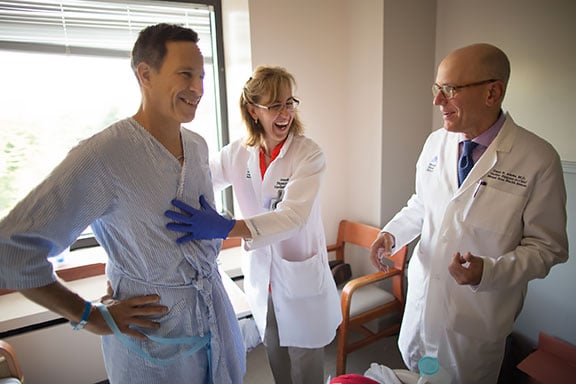Understanding Outcomes of Mitral Valve Repair
When it comes to heart valve surgery, always seek a specialist. There is a large body of evidence1 showing that the quality of outcomes is directly related to the volume of specific specialized surgical procedures that a given team performs. That's not just true for surgeons, but for other team members including: anesthesiologists, critical care doctors, and other health professionals.
As cardiac surgery has become progressively safer over the past decade, the emphasis on “mortality rate” as a marker of quality has shifted towards a better understanding of morbidities and other measure of outcomes. This is particularly relevant to mitral valve surgery for degenerative disease, especially in the context of early intervention in asymptomatic patients. Mortality rates and major morbidities rates such as stroke and mediastinal infection must be low to consider surgery in asymptomatic patients. Other parameters that should be considered as outcomes specific to degenerative mitral valve surgery include mitral valve repair vs. replacement rates, and the impact and incidence residual or recurrent mitral regurgitation following mitral valve repair.
Despite a consensus in guidelines encouraging mitral valve repair2, 3, it is interesting to note that a significant number of patients with degenerative mitral-valve disease still undergo planned mitral valve replacement all over the world, including the US. The reasons for this are multifactorial, but one principal issue is a poor match between the complexity of the degenerative mitral process and the expertise and experience of the operating surgeon. Many patients end up with a valve replacement not because the valves are irreparable, but because they are operated on by surgeons who do not have the specific expertise required to complete a successful repair given the etiology of the degenerative disease and the lesions present in a particular valve. Current practice of widespread valve replacement necessarily results in decreased life expectancy and decreased event-free survival in many patients with mitral valve prolapse. Furthermore, some patients who do have a repair undergo an inadequate repair procedure, and are discovered by their cardiologist to have residual or early recurrence of mitral regurgitation; this may again be related to mismatch between the skill of the surgeon and the complexity of the valve lesions. Patients with residual or recurrent regurgitation have reduced event-free long-term survival and many will require reoperation.
Portions excerpted, with permission, Adams DH, Anyanwu AC. The cardiologist's role in increasing the rate of mitral valve repair in degenerative disease. Current Opinion in Cardiology 2008, 23:105-110.
- 1 Chikwe J, Adams DH et. al. Relation of Mitral Valve Surgery Volume to Repair Rate, Durability, and Survival. Am J Cardiol. 2017;69:2397-2406.
- 2Bonow RO, Carabello BA, Kanu C, et al. ACC/AHA 2006 guidelines for the management of patients with valvular heart disease: a report of the American College of Cardiology/American Heart Association Task Force on Practice Guidelines (writing committee to revise the 1998 Guidelines for the Management of Patients With Valvular Heart Disease): developed in collaboration with the Society of Cardiovascular Anesthesiologists: endorsed by the Society for Cardiovascular Angiography and Interventions and the Society of Thoracic Surgeons. Circulation 2006; 114:e84-e231.
- 3Vahanian A, Baumgartner H, Bax J, et al. Guidelines on the management of valvular heart disease: The Task Force on the Management of Valvular Heart Disease of the European Society of Cardiology. Eur Heart J 2007; 28:230- 268.
